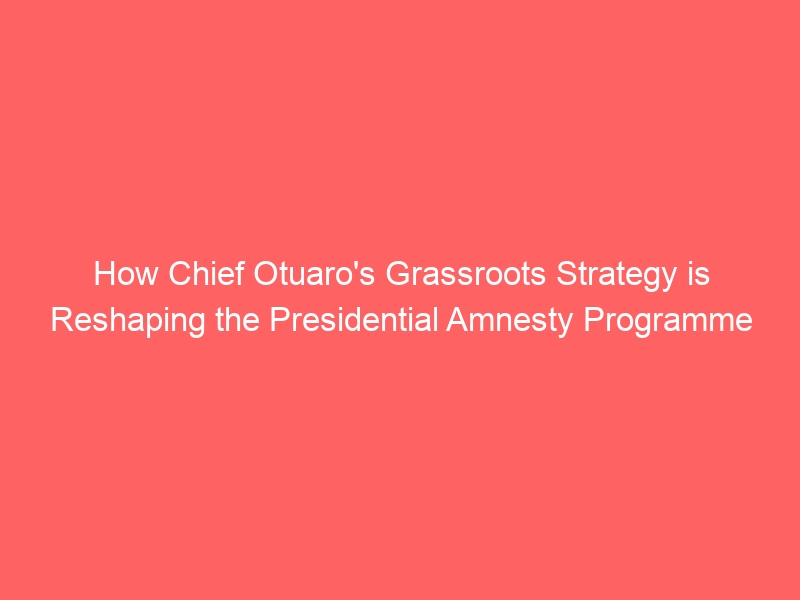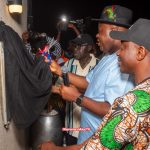By GbaramatuVoice Editorial Board
Since his appointment as the Special Adviser to the President on Niger Delta and Administrator of the Presidential Amnesty Programme (PAP) in March 2024, Chief Dennis Otuaro, PhD, has been making remarkable strides by shifting the focus to the grassroots. His approach has breathed new life into the programme, fostering a direct connection with the communities it aims to serve.
Bringing the Programme Closer to the People
From the outset, Chief Otuaro made it clear that his administration would prioritize a grassroots approach. He initiated his tenure with a comprehensive tour across the Niger Delta, meeting with ex-agitators, community leaders, and stakeholders. This tour was not merely symbolic but a fundamental shift towards inclusive governance, ensuring that the voices of the people directly impacted by the programme were heard and integrated into the decision-making process.
ALSO READ: PAP: Otuaro Approves Deployment of Delegates for 2024/25 Academic Session
Chief Otuaro also took the initiative to visit all the universities where delegates under PAP scholarships are currently studying. During these visits, he met with school administrators and students, listened to their concerns, and provided immediate solutions. His proactive approach has significantly boosted morale and trust in the programme.
June 21-25 Meetings: A New Era of Engagement
The meetings held in Effurun, Delta State from June 21 to 25 epitomize Chief Otuaro’s commitment to grassroots engagement. These sessions were designed to bridge the gap between the PAP administration and the beneficiaries, allowing for transparent and open dialogue. During these meetings, Chief Otuaro emphasized the programme’s mission to uplift the region through education, vocational training, and sustainable development. He listened attentively to the concerns and suggestions of ex-agitators and other stakeholders, reinforcing his dedication to a participatory approach.
“The success of the Amnesty Programme depends on the active involvement and feedback of our people,” Chief Otuaro stated. “We are here to serve and support you, ensuring that the benefits of this programme reach every corner of the Niger Delta.”
Key Highlights from the Stakeholders’ Meeting
Several critical issues were discussed during the stakeholders’ meeting, which saw active participation from ex-agitators, community leaders, and representatives of various organizations. The sessions were marked by candid discussions and constructive feedback, highlighting the key areas of concern and opportunities for improvement.
Rehabilitation and Reintegration: Ex-agitators expressed the need for more robust rehabilitation and reintegration programs. They emphasized the importance of psychological support and continuous vocational training to help them reintegrate smoothly into society. Chief Otuaro assured them of the administration’s commitment to enhancing these programs, including the introduction of new initiatives tailored to their needs.
Education and Skills Development: Participants highlighted the need for more educational opportunities and skills development programs. There was a consensus on the necessity of expanding the scope of vocational training to include modern and relevant skills. Chief Otuaro responded by outlining plans to introduce courses in renewable energy, digital skills, and other emerging sectors, aimed at equipping beneficiaries with the tools needed for today’s job market.
Economic Empowerment: Community leaders stressed the importance of economic empowerment initiatives. They called for more support for small and medium-sized enterprises (SMEs) and local businesses. Chief Otuaro highlighted ongoing efforts to launch local empowerment projects focused on agriculture, fisheries, and other viable sectors. These projects aim to create sustainable livelihoods and reduce dependency on government stipends.
Security and Peacebuilding: The issue of security was a significant concern, with participants urging for stronger collaboration between the PAP and local security forces. They suggested the establishment of community-driven peacebuilding initiatives. Chief Otuaro acknowledged these concerns and promised to work closely with security agencies and community leaders to maintain peace and stability in the region.
Healthcare and Social Welfare: There was a strong call for improved healthcare services and social welfare programs. Ex-agitators and stakeholders pointed out the need for accessible and quality healthcare facilities. Chief Otuaro assured them that the administration would advocate for better healthcare services and explore partnerships with healthcare providers to enhance the well-being of the communities.
Tangible Outcomes and Initiatives
Chief Otuaro’s grassroots strategy has already yielded tangible results. His administration has implemented several new initiatives based on direct feedback from the community:
Expanded vocational training programs have been introduced, recognizing the diverse needs of the Niger Delta’s youth. These programs now include more sectors such as renewable energy, digital skills, and creative industries, aiming to equip beneficiaries with relevant skills for the modern job market.
ALSO READ: Otuaro: President Tinubu Committed to Peace, Development in Niger Delta
Chief Otuaro has overseen an increase in scholarships and educational grants, ensuring that more young people from the region can access higher education. This initiative is part of a broader effort to foster long-term economic stability and growth through education.
Local empowerment projects have been launched, focusing on agriculture and small business development. These projects aim to create sustainable livelihoods and reduce dependency on government stipends.
Stakeholder Trust and Collaboration
A key aspect of Chief Otuaro’s approach has been rebuilding trust between the PAP and the communities. His administration’s transparency and willingness to address grievances head-on have been crucial in fostering a collaborative environment.
High Chief Boro Opudu, a prominent leader, praised Chief Otuaro’s efforts, stating, “For the first time in years, we feel truly heard and valued. Chief Otuaro’s approach is a breath of fresh air, and it gives us hope for a better future.”
Looking Ahead: A Vision for Sustainable Development
Chief Otuaro’s grassroots approach is not just about immediate gains but also about laying the foundation for sustainable development. His vision includes regular town hall meetings and feedback sessions to ensure ongoing communication and adjustment of the programme based on real-time feedback.
Special initiatives are aimed at empowering women and youth, recognizing their critical role in the region’s socio-economic fabric. Additionally, there is a focus on collaborating with local security forces and community leaders to maintain the peace and security essential for development.
Conclusion
Chief Dennis Otuaro’s tenure as the Special Adviser and Administrator of the Presidential Amnesty Programme has marked a significant shift towards grassroots engagement and empowerment. His approach has not only revitalized the programme but also brought hope and tangible benefits to the people of the Niger Delta. As he continues to steer the PAP with a focus on inclusivity and sustainability, the future looks promising for the region.
GbaramatuVoice commends Chief Otuaro for his transformative leadership and dedication to the grassroots. His efforts are paving the way for a more prosperous and equitable Niger Delta, one step at a time. As the programme progresses, we encourage Chief Otuaro to prioritize inclusivity and transparency, ensuring that all stakeholders, especially critical beneficiaries, are actively involved in shaping the region’s development trajectory.












